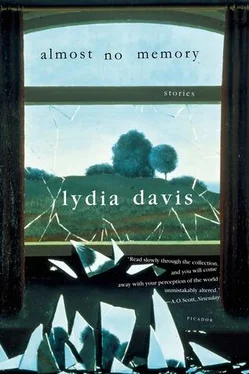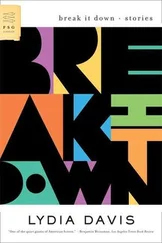Lydia Davis - Almost No Memory
Здесь есть возможность читать онлайн «Lydia Davis - Almost No Memory» весь текст электронной книги совершенно бесплатно (целиком полную версию без сокращений). В некоторых случаях можно слушать аудио, скачать через торрент в формате fb2 и присутствует краткое содержание. Год выпуска: 2001, Издательство: Farrar, Straus and Giroux, Жанр: Современная проза, на английском языке. Описание произведения, (предисловие) а так же отзывы посетителей доступны на портале библиотеки ЛибКат.
- Название:Almost No Memory
- Автор:
- Издательство:Farrar, Straus and Giroux
- Жанр:
- Год:2001
- ISBN:нет данных
- Рейтинг книги:3 / 5. Голосов: 1
-
Избранное:Добавить в избранное
- Отзывы:
-
Ваша оценка:
- 60
- 1
- 2
- 3
- 4
- 5
Almost No Memory: краткое содержание, описание и аннотация
Предлагаем к чтению аннотацию, описание, краткое содержание или предисловие (зависит от того, что написал сам автор книги «Almost No Memory»). Если вы не нашли необходимую информацию о книге — напишите в комментариях, мы постараемся отыскать её.
. In each of these stories, Davis reveals an empathic, sometimes shattering understanding of human relationships.
Almost No Memory — читать онлайн бесплатно полную книгу (весь текст) целиком
Ниже представлен текст книги, разбитый по страницам. Система сохранения места последней прочитанной страницы, позволяет с удобством читать онлайн бесплатно книгу «Almost No Memory», без необходимости каждый раз заново искать на чём Вы остановились. Поставьте закладку, и сможете в любой момент перейти на страницу, на которой закончили чтение.
Интервал:
Закладка:
We would walk, and return with burrs in our socks and scratches on our legs and arms where we had pushed through the brambles to get up into the forest, and go out again the next day and walk, and the dogs always trusted that we were setting out in a certain direction for a reason, and then returning home for a reason, but in the forest, which seemed so endless, there was hardly a distinguishing feature that could be taken as a destination for a walk, and we were simply walking, watching the sameness pass on both sides, the thorny, scrubby oaks growing densely together along the dusty track that ran quite straight until it came to a gentle bend and perhaps a slight rise and then ran straight again.
If we came home by an unfamiliar route, skirting the forest, avoiding a deeply furrowed, overgrown field and then stepping into the edge of a reedy marsh, veering close to a farmyard, where a farmer in blue and his wife in red were doing chores trailed by their dog, we felt so changed ourselves that we were surprised nothing about home had changed: for a moment the placidity of the house and yard nearly persuaded us we had not even left.
Between the forest and the fields, in the thickets of underbrush, we would sometimes come upon a farmhouse in ruins, with a curving flight of deep stone steps, worn at the edges, leading to an upper story that was now empty air, brambles and nettles and mint growing up inside and around it, and sometimes, nearby, an ancient, awkward and shaggy fruit tree, half its branches dead. In the form of this farmhouse, we recognized our own house. We went up the same curving flight of stone steps to bed at night. The animals had lived downstairs in our house, too — our vaulted dining room had once been a sheepfold.
Sometimes, in our walks, we came upon inexplicable things, once, in the cinders of an abandoned fire, two dead jackrabbits. Sometimes we lost our way, and were still lost after the sun had set, when we would start to run, and run without tiring, afraid of the dark, until we saw where we were again.
We had visitors who came from far away to stay with us for several days and sometimes several weeks, sometimes welcome, sometimes less so, as they stayed on and on. One was a young photographer who had worked with our employer and was in the habit of stopping at the house. He would travel through the region on assignments for his magazine, always taking his pictures at dawn or at sunset when the shadows were long. For every night he stayed with us, he paid us the amount he would have paid for a room at a good hotel, since he traveled on a company expense account. He was a small, neat man with a quick, toothy smile. He came alone, or he came with his girlfriend.
He played with the dogs, fondling them, wrestling with them overhead as we sat in the room below trying to work, while we spoke against him angrily, to ourselves. Or he and his girlfriend ironed their clothes above us, with noises we did not at first understand, the stiff cord knocking and sliding against the floorboards. It was hard enough for us to work, sometimes.
They were curiously disorganized, and when they went out on an errand left water coming to a boil on the stove or the sink full of warm soapy water as though they were still at home. Or when they returned from an errand, they left the doors wide open so that the cold air and the cats came in. They were still at breakfast close to noon, and left crumbs on the table. Late in the evening, sometimes, we would find the girlfriend asleep on the sofa.
But we were lonely, and the photographer and his girlfriend were friendly, and they would sometimes cook dinner for us, or take us out to a restaurant. A visit from them meant money in our pockets again.
At the beginning of December, when we began to have the oil stove going full blast in the kitchen all day, the dogs slept next to it while we worked at the dining-room table. We watched through the window as two men returned to work in a cultivated field, one on a tractor and one behind a plow that had been sitting for weeks growing rusty, after opening perhaps ten furrows. Violent high winds sometimes rose during the night and then continued blowing all day so that the birds had trouble flying and dust sifted down through the floorboards. Sometimes one of us would get up in the night, hearing a shutter bang, and go out in pajamas onto the tiles of the garage roof to tie it back again or remove it from its hinge.
A rainstorm would last hours, soaking the ruined outbuilding nearby, darkening its stones. The air in the morning would be soft and limp. After the constant dripping of the rain or wuthering of the wind, there was sometimes complete silence, minute after minute, and then abruptly the rocky echoes of a plane far away in the sky. The light on the wet gravel outside the house was so white, after a storm, it looked like snow.
By the middle of the month, the trees and bushes had begun to lose their leaves and in a nearby field a stone shed, its black doorway overgrown by brambles, gradually came into view.
A flock of sheep gathered around the ruined outbuilding, fat, long-tailed, a dirty brown color, with pale scrawny lambs. Jostling one another, they poured up out of the ruin, climbing the tumble-down walls, the little ones crying in high human voices over the dull clamor of the bells. The shepherd, dressed all in brown with a cap pulled low over his eyes, sat eating on the grass by the woodpile, his face glowing and his chin unshaven. When the sheep became too active, he grunted and his small black dog raced once around the side of the flock and the sheep cantered away in a forest of stick-like legs. When they came near again, streaming out between the walls, the dog sent them flying again. When they disappeared into the next field, the shepherd continued to sit for a while, then moved off slowly, in his baggy brown pants, a leather pouch hanging on long straps down his back, a light stick in one hand, his coat flung over his shoulder, the little black dog charging and veering when he whistled.
One afternoon we had almost no money left, and almost no food. Our spirits were low. Hoping to be invited to dinner, we dropped in on the businessman and his wife. They had been upstairs reading, and came down one after the other holding their reading glasses in their hands, looking tired and old. We saw that when they were not expecting company, they had in their living room a blanket and a sleeping bag arranged over the two armchairs in front of the television. They invited us to have dinner with them the next night.
When we went to their house the next night, we were offered rum cocktails by Monsieur Assiez-de-Pompignan before dinner and afterward we watched a movie with them. When it ended, we left, hurrying to our car against the wind, through the narrow, shuttered streets, dust flying in our teeth.
The following day, for dinner, we had one sausage. The only money left now was a pile of coins on the living-room table collected from saucers around the house and amounting to 2.97 francs, less than fifty cents, but enough to buy something for dinner the next day.
Then we had no money at all anywhere in the house, and almost nothing left to eat. What we found, when we searched the kitchen carefully, was some onions, an old but unopened box of pastry crust mix, a little fat, and a little dried milk. Out of this, we realized, we could make an onion pie. We made it, baked it, cut ourselves two pieces, and put the rest back in the hot oven to cook a little more while we ate. It was surprisingly good. Our spirits lifting, we talked as we ate and forgot all about the pie as it went on baking. By the time we smelled it, it had burned too badly to be saved.
In the afternoon of that day, we went out onto the gravel, not knowing what to do now. We tossed pebbles for a while, there in the boiling sun and the cool air, saying very little because we had no answer to our problem. Then we heard the sound of an approaching car. Along the bumpy dirt road that led to our house from the main road, past the house of the weekend people, of pink stucco with black ironwork, and then past a vineyard on one side and a field on the other, came the photographer in his neat rented car. By pure chance, or like an angel, he was arriving to rescue us at the very moment we had used up our last resource.
Читать дальшеИнтервал:
Закладка:
Похожие книги на «Almost No Memory»
Представляем Вашему вниманию похожие книги на «Almost No Memory» списком для выбора. Мы отобрали схожую по названию и смыслу литературу в надежде предоставить читателям больше вариантов отыскать новые, интересные, ещё непрочитанные произведения.
Обсуждение, отзывы о книге «Almost No Memory» и просто собственные мнения читателей. Оставьте ваши комментарии, напишите, что Вы думаете о произведении, его смысле или главных героях. Укажите что конкретно понравилось, а что нет, и почему Вы так считаете.












